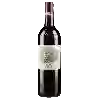
Winery Daniel MoutyBordeaux Merlot
In the mouth this red wine is a powerful with a nice balance between acidity and tannins.
This wine generally goes well with poultry, beef or veal.
Taste structure of the Bordeaux Merlot from the Winery Daniel Mouty
Light | Bold | |
Smooth | Tannic | |
Dry | Sweet | |
Soft | Acidic |
In the mouth the Bordeaux Merlot of Winery Daniel Mouty in the region of Bordeaux is a powerful with a nice balance between acidity and tannins.
Food and wine pairings with Bordeaux Merlot
Pairings that work perfectly with Bordeaux Merlot
Original food and wine pairings with Bordeaux Merlot
The Bordeaux Merlot of Winery Daniel Mouty matches generally quite well with dishes of beef, veal or game (deer, venison) such as recipes of baked lasagna, duck breast with red fruits or giant paella cooked on a wood fire.
Details and technical informations about Winery Daniel Mouty's Bordeaux Merlot.
Discover the grape variety: Merlot
Merlot noir is a grape variety that originated in France (Bordeaux). It produces a variety of grape specially used for wine making. It is rare to find this grape to eat on our tables. This variety of grape is characterized by small to medium sized bunches, and medium sized grapes. Merlot noir can be found in many vineyards: South West, Languedoc & Roussillon, Cognac, Bordeaux, Loire Valley, Armagnac, Burgundy, Jura, Champagne, Rhone Valley, Beaujolais, Provence & Corsica, Savoie & Bugey.
Informations about the Winery Daniel Mouty
The Winery Daniel Mouty is one of of the world's greatest estates. It offers 10 wines for sale in the of Bordeaux to come and discover on site or to buy online.
The wine region of Bordeaux
Bordeaux, in southwestern France, is one of the most famous, prestigious and prolific wine regions in the world. The majority of Bordeaux wines (nearly 90% of the production Volume) are the Dry, medium and Full-bodied red Bordeaux blends for which it is famous. The finest (and most expensive) are the wines of the great châteaux of Haut-Médoc and the right bank appellations of Saint-Émilion and Pomerol. The former focuses (at the highest level) on Cabernet Sauvignon, the latter on Merlot.
The word of the wine: Heart-to-heart
Small stem from a quick bud that is removed during thinning.














